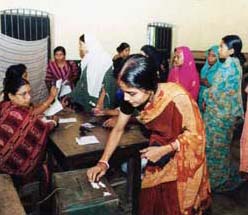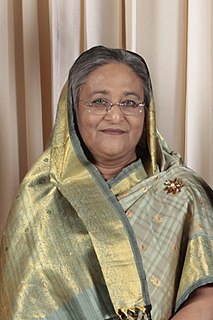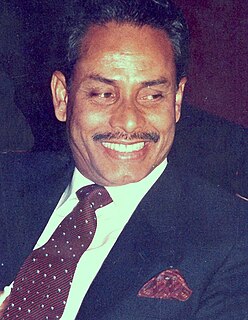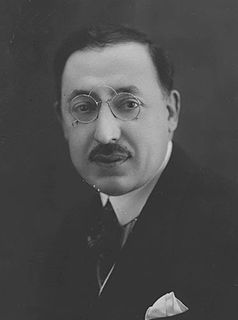
Politics of Bangladesh takes place in a framework of a parliamentary representative democratic republic, whereby the Prime Minister of Bangladesh is the head of government, and of a multi-party system. Executive power is exercised by the government. Legislative power is vested in both the government and parliament. The Constitution of Bangladesh was written in 1972 and has undergone sixteen amendments. The Economist Intelligence Unit has rated Bangladesh as "hybrid regime" in 2016.

The Bangladesh Awami League, often simply called the Awami League or AL, is one of the two major political parties of Bangladesh.

The Jatiya Sangsad, often referred to simply as the Sangsad or JS and also known as the House of the Nation, is the supreme legislative body of Bangladesh. The current parliament of Bangladesh contains 350 seats, including 50 seats reserved for women, which are apportioned on elected party position in the parliament. Elected occupants are called members of parliament or MP. The 11th National Parliamentary Election was held on 30 December 2018. Elections are held every five years unless the parliament is dissolved before that time.
Abdul Qasim Mohammad Badruddoza Chowdhury served as the President of Bangladesh from 14 November 2001 until his resignation on 21 June 2002. He was the founding secretary-general of Bangladesh Nationalist Party (BNP).

Hussain Muhammad Ershad is a former Bangladeshi Army Chief and politician who served as the President of Bangladesh from 1983 to 1990, a time many consider to have been a military dictatorship.
Islami Jatiya Oikya Front was a short-lived political alliance in Bangladesh. Formed in 2001, it was one of the three principal contenders in that year's parliamentary elections. Led by the Jatiya Party (Ershad), it also included the Islami Shashontantra Andolan (ISA) and three smaller parties.

Elections in Bangladesh gives information on election and election results in Bangladesh.
Sramik Krishak Samajbadi Dal is a Marxist-Leninist political party in Bangladesh. The SKSD was formed in 1969 by sympathizers of the Revolutionary Socialist Party of India in East Pakistan. The party was led by A. K. Fazlul Huq.

The Jatiya Party is a conservative political party in Bangladesh. The current chairman of the party is Hussain Mohammad Ershad. On January 3, 2019, the party announced its decision to join the Awami League-led Grand Alliance after having been in opposition for the previous parliamentary term. However, the party backtracked the next day and announced that it intended to remain part of the opposition. Currently, it holds Rangpur out of Bangladesh's 12 city corporations.

The Fifth National Parliamentary Elections 1991 were held in Bangladesh on 27 February 1991. The result was a victory for the Bangladesh Nationalist Party, which won 140 of the 300 seats. Voter turnout was 55.4%. As a result, BNP leader Khaleda Zia was sworn in as Prime Minister on 20 March.

The Seventh National Parliamentary Elections 1996 were held in Bangladesh on 12 June 1996. The result was a victory for the Bangladesh Awami League, which won 146 of the 300 seats, beginning Sheikh Hasina's first-term as Prime Minister. Voter turnout was 75.6%, the highest to date. This election was the second to be held in 1996, following controversial elections held in February a few months earlier.

General elections were held in Bangladesh on 7 May 1986. A total of 1,527 candidates contested the election. The result was a victory for the Jatiya Party, which won 153 of the 300 seats. Voter turnout was 61.1%. Bangladesh Nationalist Party, the winner of the previous elections, boycotted the election.

General elections were held in Bangladesh on 3 March 1988. They were boycotted by several major parties, including the Bangladesh Awami League, the Bangladesh Nationalist Party, the Communist Party of Bangladesh, Jamaat-e-Islami Bangladesh, the Bangladesh Krishak Sramik Awami League, the National Awami Party (Muzaffar) and the Workers Party of Bangladesh. The result was a victory for the Jatiya Party, which won 251 of the 300 seats. Voter turnout was 52.5%.
The Sixth National Parliamentary Elections 1996 was held in Bangladesh on 15 February 1996. They were boycotted by most opposition parties, and saw voter turnout drop to just 21%. The result was a victory for the Bangladesh Nationalist Party (BNP), which won 300 of the 300 elected seats. This administration was short lived however, only lasting 12 days before the installation of caretaker government and fresh elections held in June.
1986 (MCMLXXXVI) was a common year starting on Wednesday of the Gregorian calendar, the 1986th year of the Common Era (CE) and Anno Domini (AD) designations, the 986th year of the 2nd millennium, the 86th year of the 20th century, and the 7th year of the 1980s decade.
The history of Bangladesh after independence begins in 1971 with the independence of Bangladesh from Pakistan.

Parliamentary elections were held in Iran in 1947. The newly elected parliament was opened on 17 July. The election was a three-way power struggle between Ahmad Qavam, Mohammad Reza Shah and pro-Britain conservative politicians.

Rashed Khan Menon is a Bangladeshi politician. He is the chairman of Workers Party of Bangladesh and was elected as the Member of Parliament (MP) for Dhaka-8 in the 2008 general election. Menon was re-elected at the 2014 general elections. He is the chairman of the Parliamentary Standing Committee of the Ministry of Education. Earlier, he served as the Minister for Civil Aviation and Tourism.
Mohammad Hanif was a Bangladeshi politician who served as Mayor of Dhaka City Corporation from 1994 until 2002.
Merina Rahman is a Bangladesh Jatiya Party politician and Member of Parliament. She is the sister of former Military dictator and president of Bangladesh, Hussain Mohammad Ershad.





















